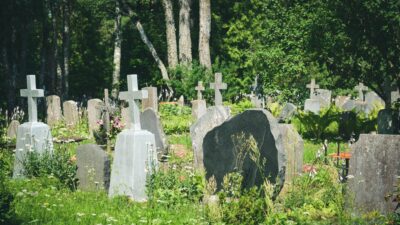G Seller offers a professional grave maintenance service to help you take care of your loved one's final resting place.
When a loved one passes away, it can be an extremely difficult and emotional time. One of the things you may need to think about is who is responsible for maintaining the grave. This can be a confusing and complicated topic, so we've put together some information to help.
In the UK, there are four main types of graves: public graves, private graves, Churchyard graves, and natural burial grounds. The owner or owners of each type of grave have different responsibilities when it comes to maintenance.
Public Graves (also known as Common Grave)
Public graves are owned by local councils or parish councils. Each burial ground differs as to whether they have any available public graves and the criteria to be eligible to be laid to rest in that grave. Usually, a public grave is there for people who have passed away without any next of kin and/or have no means to be able to pay for a burial plot. The council is responsible for maintaining the grave and ensuring that it meets health and safety standards.
Private Graves
Private graves are owned by individuals or families. There is usually a grave ownership term of between 30-75 years but each cemetery has their own rules and regulations, please call us to discuss an individual cemetery and we can advise.
If you decide to have a headstone placed on the grave in memory of your loved one, then the upkeep of it is the responsibility of the grave owner. The placing of fresh flowers and subsequent removal when they have died is the responsibility of the grave owner. Also, there is usually rules and regulations that the grave owner has to sign to say they will adhere to which covers the use of trinkets and grave decorations.
Even though you may own the exclusive right of burial to the grave, the burial ground authority (usually a council but sometimes a private organisation) has a duty of care to all visitors to the cemetery. Therefore, they will maintain the cemetery in terms of mowing and strimming the grass, making sure headstones are up to today’s safety standards, emptying bins and maintaining pathways.
Churchyard Graves
In a Churchyard, you cannot own the exclusive right of burial, the ownership is retained by the Church.
It can become complicated of whose responsibility it is to maintain the Churchyard depending on whether the Churchyard is open or closed.
When a Churchyard is open, it simply means it is open for people to be laid to rest there. It is the Church's responsibility to maintain the Churchyard. When a Churchyard is closed, it usually means the responsibility to maintain the Churchyard will fall to the local council.
The only way to reserve a plot in a Churchyard is going through the faculty process with no guarantee of success. A fee is payable to put forward a faculty to be heard by the Church council as to whether your request can be granted.
Even though you can’t own a grave, once your loved one is laid to rest in a grave, you can still put a headstone on the grave. There are quite strict regulations of what headstones you are allowed in a Churchyard, please speak to one of our memorial team to discuss an individual Churchyard if you have any queries.
Natural Burial Grounds
Natural burial grounds are owned by a variety of organisations. The owner or owners of the burial ground are responsible for maintaining it. Some natural burial grounds you can purchase the plot, others you cannot, please speak to us about a specific natural burial ground and we can advise accordingly.
Usually, a natural burial ground will only allow a grave to be prepared to single depth. Usually you can’t put a memorial on the grave, it may be allowed to have a wooden plaque, depending on the natural burial ground in question.
The upkeep and maintenance of the natural burial ground will be the responsibility of the organisation that owns the burial ground.
Get Professional Help
G Seller offers a professional grave maintenance service to help you take care of your loved one's final resting place. We can carry out all the tasks necessary to keep the grave in good condition, including mowing the grass, removing weeds and rubbish, and checking for health and safety hazards. This can be as frequent or infrequent as you’d like. G Seller will take care of it all.
In Summary
When a loved one passes away, it's important to think about who is responsible for maintaining their grave. In the UK, there are four main types of graves: public graves, private graves, Churchyard graves and natural burial grounds. If you're not sure who is responsible for maintaining a grave, you can contact G Seller to find out more.
If you need help maintaining a grave, G Seller offers a professional grave maintenance service. We can carry out all the tasks necessary to keep the grave in good condition, giving you peace of mind during this difficult time. Contact us today to find out more.




